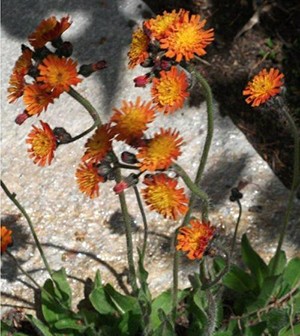
At this time of year, Deschutes County urges residents to be on the lookout for Orange Hawkweed, a rapidly spreading noxious weed found mainly in residential areas throughout the County.
Orange Hawkweed is a perennial weed that can be identified by bright orange colored flowers clustered on top of a leafless stem (see photo below). The five-inch long, lance-shaped leaves are hairy and the roots are highly fibrous. Once established, Orange Hawkweed forms dense mats that crowd-out other vegetation, and left unchecked-can dominate lawns, landscaped areas, roadways meadows and pastures.
In addition to being spread through prolific seed and abundant above-ground runners (stolons), this noxious weed is usually spread when residents share it with their neighbors and friends.
“We are encouraging residents to become familiar with identifying this plant.
If you find orange hawkweed, please report its’ location and help us eradicate it before it becomes the next spotted knapweed-which has spread across thousands of acres across the County,” said County Forester Ed Keith.Hawkweed can be controlled by chemical treatment or by digging-up and destroying the plant. Orange Hawkweed is on the Oregon Department of Agriculture’s and Deschutes County’s “A” rated noxious weed list as a top priority for intensive control and monitoring.
HELP FOR LANDOWNERS: The County currently has a grant through the Oregon Department of Agriculture to financially help landowners treat and control Orange Hawkweed. Residents who think they may have this plant growing on their property are asked to contact Deschutes County Forester Ed Keith at (541) 322-7117, or send email to EdK@deschutes.org .
www.deschutes.org/weeds .




